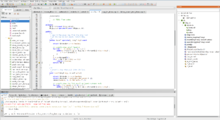 A screenshot of the open-source CodeLite C/C++ IDE | |
| Developer(s) | Eran Ifrah |
|---|---|
| Stable release | 17.0.0[1] |
| Repository | |
| Written in | C++ |
| Operating system | Windows, macOS, Linux |
| Platform | IA-32, x64 |
| Type | IDE |
| License | GPL-2.0-or-later[a][2][3] |
| Website | codelite |
CodeLite is a free and open-source IDE for the C, C++, PHP, and JavaScript (Node.js) programming languages.[4][5]
History[edit]
In August 2006, Eran Ifrah started an autocomplete project named CodeLite. The idea was to create a code completion library based on ctags, SQLite (hence, CodeLite), and a Yacc based parser that could be used by other IDEs. Later Clang became an optional parser for code completion, greatly improving its functionality.
LiteEditor, a demo application, was developed for demonstrating CodeLite's functionalities. Eventually, LiteEditor evolved into CodeLite.
General[edit]
CodeLite is a free, open-source, cross-platform IDE for the C/C++ programming languages using the wxWidgets toolkit. To comply with CodeLite's open-source spirit, the program itself is compiled and debugged using only free tools (MinGW and GDB) for Mac OS X, Windows, Linux and FreeBSD, though CodeLite can execute any third-party compiler or tool that has a command-line interface. CodeLite also supports PHP and JavaScript development (including Node.js support).
CodeLite features project management (workspace/projects), code completion, code refactoring, source browsing, syntax highlighting, Subversion integration, cscope integration, UnitTest++ integration, an interactive debugger built over gdb and a source code editor (based on Scintilla).[6][7][8]
CodeLite is distributed under the GNU General Public License v2 or Later. It is being developed and debugged using itself as the development platform with daily updates available through its Git repository.
See also[edit]
Notes[edit]
- ^ With an exception for plugins.
References[edit]
- ^ "Release 17.0.0". 14 January 2023. Retrieved 7 February 2023.
- ^ "CodeLite • A free, Open Source, Cross Platform C, C++, PHP and Node.js IDE". Retrieved 2021-06-22.
- ^ "codelite/LICENSE at master · eranif/codelite · GitHub". GitHub. Retrieved 2021-06-22.
- ^ CodeLite Homepage
- ^ CodeLite on SourceForge
- ^ "CodeLite main features page". Retrieved 2020-03-03.
- ^ Nicholas Godwin. "Full Full CodeLite IDE Software Review – All You Need to Know About CodeLite IDE Software Review – All You Need to Know About CodeLite". p. Skyose. Archived from the original on March 3, 2020. Retrieved 2020-03-03.
- ^ "LiteEditor". Retrieved 2020-03-03.
Well, that’s interesting to know that Psilotum nudum are known as whisk ferns. Psilotum nudum is the commoner species of the two. While the P. flaccidum is a rare species and is found in the tropical islands. Both the species are usually epiphytic in habit and grow upon tree ferns. These species may also be terrestrial and grow in humus or in the crevices of the rocks.
View the detailed Guide of Psilotum nudum: Detailed Study Of Psilotum Nudum (Whisk Fern), Classification, Anatomy, Reproduction